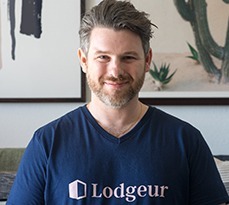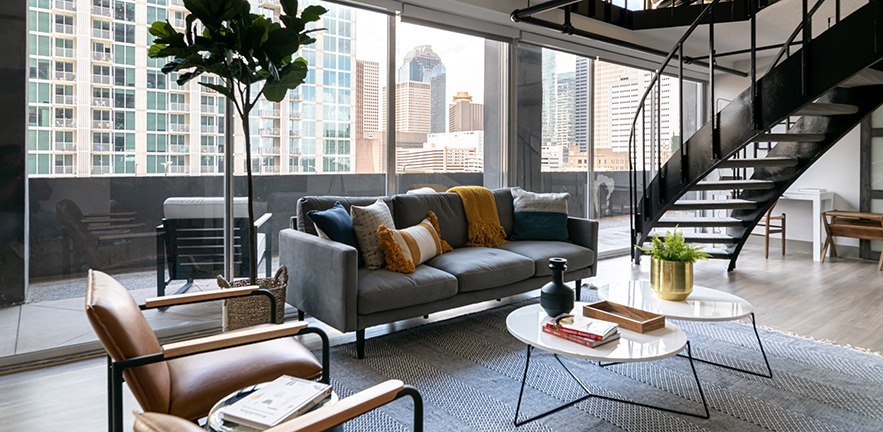
Conventional wisdom holds that the sharing economy results in people often seeking the cheapest offer – be it taxi
rides, vacation rentals or consumer goods through online auction sites.
Sébastien Long, who grew up immersed in his family’s hospitality business on the French island of Corsica, came to a different conclusion when it comes to aesthetics and price.
Following a decade-long career in banking with HSBC, Sébastien in 2016 enrolled in the Executive MBA (EMBA) programme at Cambridge Judge Business School to pivot toward entrepreneurship. He worked briefly in London for short-term rental company Sonder, and for his EMBA individual project wrote a research paper challenging such ‘cheap’ conventional wisdom.
The paper – entitled “Marginal willingness to pay in the sharing economy” – concluded that investing in interior design is smart business practice for hospitality entrepreneurs.
“Interior design is highly valued by customers, but its intangible nature is undervalued by companies,” says Sébastien. “I was able to place a value on interior design in terms of a customer’s marginal willingness to pay to upgrade from an average property to one with great interior design, which is much higher than people would expect.”
Less than a year later, after marrying EMBA 2016 classmate Brooke Bornick a day before graduation and moving to her home in Texas, Sébastien launched a new company offering short- and medium-term accommodations, focused on stylish and comfortable interior design, at 2 locations in Houston. The company’s name – Lodgeur – is an amalgam of English and French words related to housing.
“After the EMBA and moving to the US, launching Lodgeur was the obvious next step for me,” says Sébastien, who was born in the UK and grew up between Britain and France (working summers at his family’s Corsican resort from age 13).
“I’ve interacted with over 30,000 travellers at my family’s resort, and as an expatriate banking executive I worked in nine countries across 5 continents. I’ve spent years of my life sleeping in hotels and extended-stay apartments – luxury boutique hotels or big branded ones, bed and breakfasts or Airbnbs, campgrounds – I’ve tried them all. I‘ve always been fascinated with hospitality, analysing and comparing my experiences each time.”
Lodgeur began welcoming guests in April at a pilot portfolio of 7 apartments in Houston (the first guest was another EMBA classmate on a business trip), and has seen revenue increases of 20 to 30% in each of the first 4 months, with a July occupancy rate topping 80%.
Lodgeur leases blocks of apartments from companies that own or operate apartment buildings, and its interior designer then furnishes and decorates each apartment individually – focusing on style and a feel for the building’s history; one of Lodgeur’s buildings once had a nightclub that attracted the likes of Frank Sinatra and Bing Crosby in the 1960s, so apartment details such as a retro Bluetooth speaker, artwork and books provide a nod to that iconic musical heritage. The cost: for midweek in mid-September, apartments range from $89 per night for a one-bedroom property for 2 guests to $199 for a 2-bedroom for 4 guests.
Lodgeur hopes to sign up another 100 apartments in the final quarter of 2019. The company now has 2 full-time and 4 part-time employees, along with many outside contractors. Legal work is performed by Brooke, who worked at top US law firms before embarking on her EMBA at Cambridge Judge.
From his new home in Houston, Sébastien says his business plan seeks to tackle in the sharing-economy age the issue of hotel-quality unpredictability addressed by Hilton hotels founder Conrad Hilton when he began his hotel chain in Texas in the 1920s. Prior to chains such as Hilton and Marriott, travellers didn’t know what to expect when they arrived at hotels and were often disappointed or worse; Sébastien says similar issues affect many Airbnb lodgings today – including cleanliness, access, and hosts who make guests feel uncomfortable – and he argues that customers can’t trust inflated rating systems.
“We’re trying to fill a gap” between uneven Airbnb properties and chain hotels that have become industrial and soulless, Sébastien says. Lodgeur’s website says it offers the “comfort and consistency of a hotel” without the “hassle of a check-in desk and drab décor. Our guests want beautifully designed homes. But without invasive and amateur hosts.”
Sébastien acknowledges that like all startups Lodgeur faces plenty of challenges, including competition from rival companies including his former employer Sonder. Yet he sees late-mover advantage in using existing technology, such as property management platforms and dynamic pricing tools, to keep costs down. Sébastien has also drawn on both his EMBA and banking background to bring skills and insight to his new business.
“My thinking as an entrepreneur has been influenced by EMBA classes such as corporate finance, management science and an elective in entrepreneurial finance – particularly in understanding the importance of cash flow, cost of capital and seeing probabilities as a distribution rather than a number, in other words avoiding the ‘flaw’ of averages.” Lodgeur hopes to avoid the flaws of average hotel rooms by offering something more beautiful – and, armed with his EMBA research from Cambridge Judge, Sébastien is convinced that customers are willing to pay for that aesthetic advantage.


